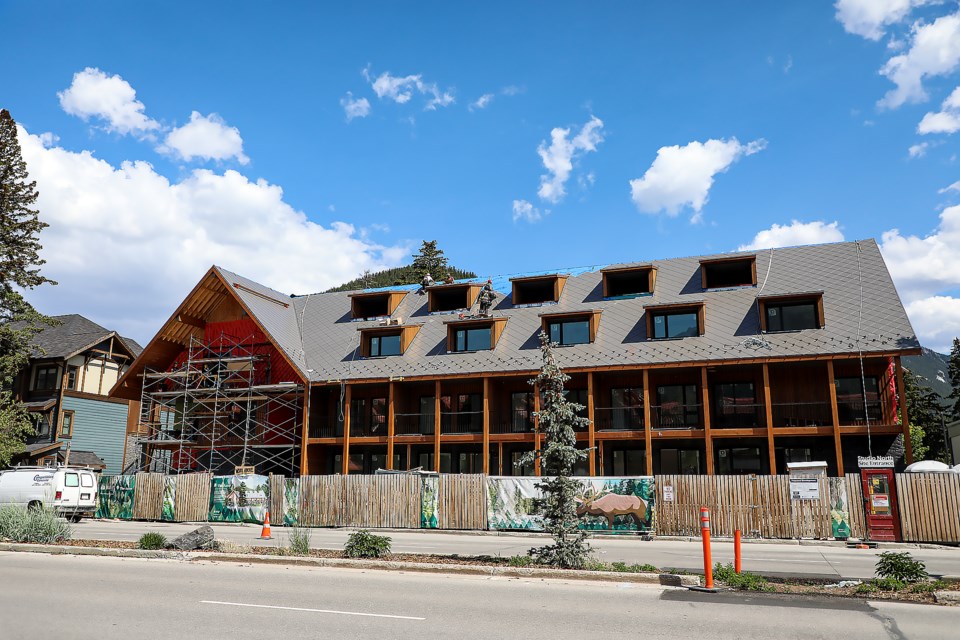BANFF – The Wim & Nancy Pauw Foundation has offered to kick in money for a proposed affordable housing development on Wolf Street if the lower level includes much-needed community and gathering spaces.
Council has decided to spend $110,000 to kick-start a site analysis of the public service-zoned parcel of land by Mineral Springs Hospital, including geotechnical investigation, site survey, civil engineering, and site predesigns for construction of a mixed-use development of rental and for-purchase homes.
In addition, council directed administration to explore options for public amenities on the ground floor of the affordable housing initiative.
Pauw Foundation officials say community spaces could include a commercial kitchen and food hub, a purpose-built space for family and child network activities, not-for-profit meeting spaces, gathering areas for youth, adult and community programming, and a Community Cruisers downtown space.
“Should a shared community space be an outcome for the development, we have an intention to make a material financial commitment which could positively advance the financial viability of the project,” said Cathy Geisler, the foundation’s executive director in a letter to council.
The current zoning on this 3,200-square-metre Wolf Street site allows for a combination of public service amenities on the ground floor, such as community services programming, government, or educational, and could be developed with a mixed-use housing development above.
Administrators say that with the land use bylaw review currently underway, a discretionary use may permit housing on all levels of the development with the provision of below-market housing, but both options could be further explored at council’s direction.
The final unit count will not be determined until the full analysis has been completed; however, it is anticipated that between 40-50 units may be possible on this site depending on any changes made to the land use bylaw.
Mayor Corrie DiManno said the Wolf Street site – which includes a forested area by the hospital and a paid parking lot by the provincial health unit – is a prime location because it is close to downtown and to nature.
“I definitely see the vision in terms of trying to do a blend of rental and for-purchase, as well as public amenity space,” she said.
“I’m really glad to see the Pauw Foundation wanting to have conversations around that as we know we do have a lack of community space in town.”
Tatanga Ridge project on backburner
Under the federal government’s Housing Accelerator Fund (HAF) agreement with the Town of Banff for $4.66 million, the municipality must issue development permits for a minimum of 43 affordable housing units by March 2027.
That means a look at a 250-unit housing project for rental and for-purchase homes on the Tatanga Ridge benchlands on the northeast entrance to town is on the back burner for now.
Preliminary investigation of that site suggests the development of roads to access the land parcel and utility servicing include significant costs of between $23.5 million and $24.6 million. Agreements for access would also be needed from local hotel operators.
Stephen Allan, engineering coordinator for the Town of Banff, said the first possibility is for the public access road along undeveloped Deer Street right-of-way with a secondary fire-only access route passing through the front of the Canoe Hotel site.
The second viable option, he said, is to build the public access road from Banff Avenue up to the site and connect the secondary fire-only access to the Tatanga 1 development.
“Both options necessitate road construction outside the town boundary, which would be subject to approval from Parks Canada,” said Allan.
Alison Gerrits, the director of community services for the Town of Banff, said the Tatanga Ridge project is not off the table, but an affordable housing project on Wolf Street could meet the conditions of the HAF agreement.
“In no way do we want to convey this particular housing opportunity in Tatanga is over … what we have learned through work we’ve done so far is it will not be expedient,” she said.
“We need to find an affordable housing project we can complete within the timelines in the Housing Accelerator Fund.”
Banff’s current housing shortfall is estimated between 700-1,000 units.




